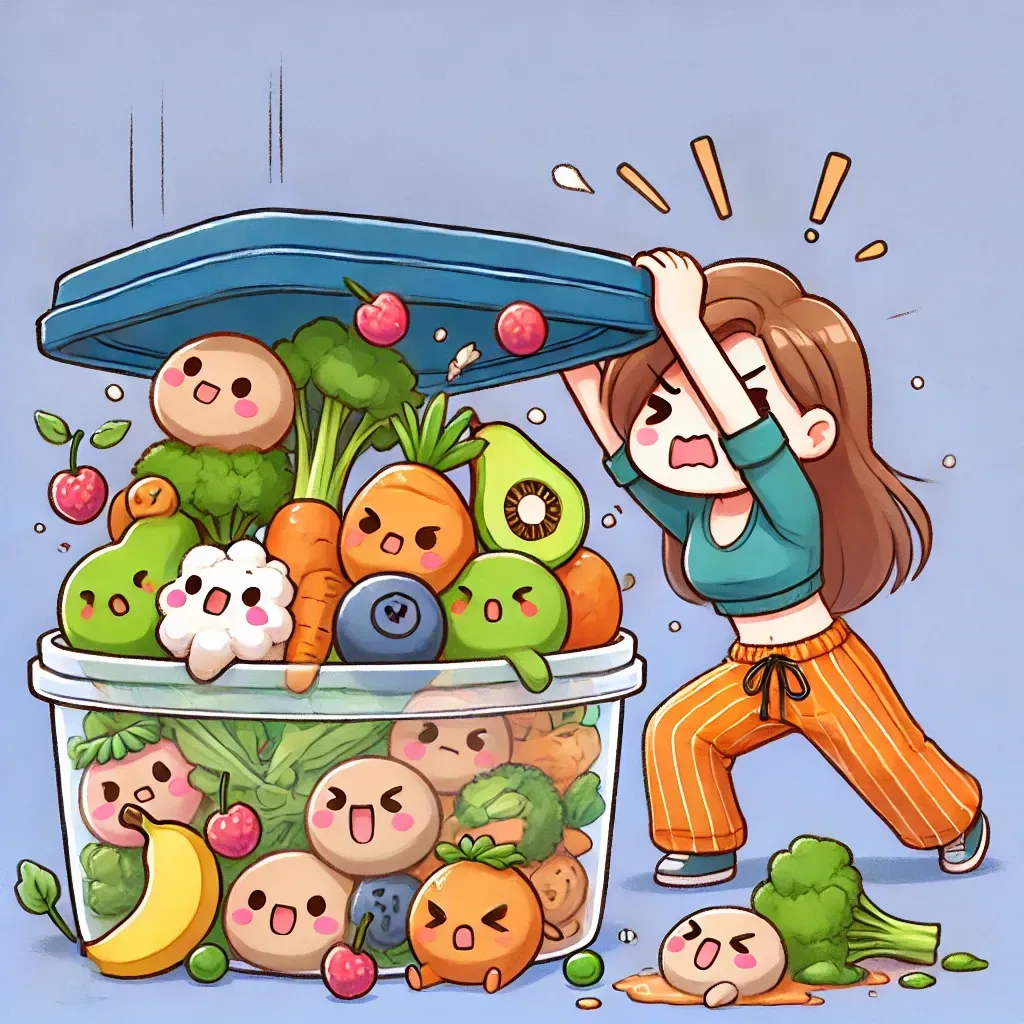10 Rules of Nutrition
Nutrition for Optimal Health

You need water to keep your cells hydrated and protected, and to eliminate waste. Adequate hydration will improve a number of health problems including sinusitis, constipation, inflammation, allergies, fatigue, joint pain, headaches, weight issues and many other afflictions.
2. Half of the food you eat (by volume) should be vegetables.
- They provide you with many health benefits:
- Eating vegetables can reduce the instance of cancer and heart disease, increase your energy and mental clarity, reduce the problems caused by bowel and liver toxicity, help reduce the symptoms of arthritis, skin problems, digestive problems, chronic pain, and many other health problems.
- Vegetables are high in fiber, which slows absorption of fat and toxins. Eating fiber is a great way to lose weight.
- Vegetables are also high in folic acid, which is necessary to produce serotonin (preventing depression and overeating), and it increases energy.
- Vegetables nourish normal gut bacteria which in turn nourish the lining of the GI tract, produce vitamins, and inhibit yeast and other undesirable organisms. They also speed up bowel transit time, which reduces bowel toxicity and prevents irritation of the GI lining.
3. Avoid deep fried food, partially-hydrogenated oil, and hydrogenated oil.
Hydrogenation produces trans fats, which have been linked to a number of health problems such as cancer, heart disease, pain and inflammation, immune system problems, depression, fatigue, and skin problems.
4. Eat adequate HEALTHY fats.
Stress and sex hormones are made up of fat--cholesterol actually, LDL cholesterol. Every cell in the body needs healthy fats to be in order to be created and then maintained. Unsaturated fats decreases bad cholesterol, give our hair its shine, promote weight loss, reduce inflammation and lower the risk of heart disease [1]. They also make our food taste better and keep us fuller longer. Permissible fats include raw nuts (not roasted), virgin or extra virgin olive oil, lard, tallow, schmaltz and avocados.
5. Avoid refined sugar.
Natural sugars are found in fruit and dairy products, and they provide essential nutrients that keep the body healthy and help prevent disease. Refined sugar comes from sugar beets or sugar cane and is added to many processed foods (low-fat foods in particular--manufactures add more sugar so they have a similar taste but less calories) [2].
The way the body metabolizes natural sugar from fruit and milk differs from how it metabolizes refined sugar. Fruit and milk have sugar, yes, but they also have fiber, which slows down metabolism and expands in the gut to make you feel full. Refined sugar breaks down and is digested very quickly, causing insulin and blood sugar levels to surge. Because of this rapid process, you don’t feel full after you’re done eating, no matter how many calories you consumed [2]. During this process, refined sugar also increases adrenal hormone production and, in combination with increased insulin production, this can cause the following health problems:
- Increased production of adrenal hormones causes the body to excrete essential minerals.
- Sugar feeds yeast and other one-celled organisms found in the bowel, causing them to multiply. These organisms produce toxins, irritate the lining of the GI tract and take the place of normal, helpful bacteria.
- Excess insulin creates more sugar cravings. More sugar is eaten, more insulin produced, etc. This stresses the pancreas and sets the stage for adult-onset diabetes.
- Sugar consumption can make pain and inflammation worse.
- Sugar can cause or aggravate allergies, sinusitis, asthma, irritable bowel, Candidiasis, migraine headaches, fatigue, depression, and even heart disease.
6. Avoid refined carbohydrates.
Refined carbohydrates are grains that have had fiber, vitamin E, B vitamins, bran and germ removed. They fill you up, but lack vitamins and minerals, the combination stressing your digestive and endocrine systems.
- Read the labels on bread. Brown-colored bread labeled ʺwheat breadʺ isnʹt usually whole wheat. If the label says ʺenriched, white flourʺ on it, youʹre not getting a whole grain.
- Use brown rice instead of white rice.
- Eat whole oats instead of instant oatmeal.
- Eat “whole grain” pasta noodles.
- Try some of the more “exotic” grains available now, like amaranth and quinoa.
7. Avoid gluten and gluten containing foods.
Gluten is highly inflammatory, and inflammation is the basis of all health issues. One of the major proteins that makes up wheat gluten is gliadin. Gliadin triggers zonulin to open up the tight junctions of the gut causing leaky gut--a major gut health imbalance that impacts GI health, mood, immune system, hormones, fatigue, and our ability to maintain a healthy weight.
8. The importance of eating enough protein can not be overstated.
It's not just the total amount of protein you eat every day that matters, getting enough at each meal is also important. It is the simplest and easiest way to maintain a healthy weight and have a better looking body. Period. So fill up on protein: get 20-30 grams at each meal. This promotes fullness and preserves muscle mass [3]. Protein also raises insulin in the short-term, however, it should lead to long-term reductions in insulin resistance by helping you lose belly fat loss. High insulin means fat storage, and low Insulin means fat loss.
9. Avoid additives and chemicals (found in processed foods).
The FDA tests and approves single additives, but no one has any idea what combinations of additives do to us. The list of harmful additives is much too long to present here, but below are a few examples of chemicals found in packaged food:
- Mono and diglycerides: Used to maintain softness in baked goods. These are on the FDA list of food additives to be studied for causing possible birth defects, cancer, and reproductive problems.
- Brominated vegetable oil (BVO): Used as an emulsifier. The FDA has it on the suspect list. Bromates are highly toxic. They can cause death through kidney failure or nervous system problems. Between two and four ounces of a 2% solution can poison a child.
- Red #40: Suspected carcinogen. Whenever you see a color followed by a number, avoid that food.
- Sodium nitrite: Makes meat bright red and kills Clostridium Botulinum spores (botulism). Found in luncheon meats. Nitrites combine with natural stomach acid and chemicals in the food to form nitrosamines, which are powerful carcinogens.
- Aspartame (sold as Equal and Nutrasweet): Possible link to brain cancer. May cause headaches, depression and anxiety attacks, or memory loss. It also raises the pH of urine and may be linked to kidney and bladder infections.
- THBQ (Tertiarybutylhydroquinone): This chemical gives foods a long shelf-life, but food manufacturers had a hard time getting this approved. Death has occurred from ingestion of five grams (about 1/5 of an ounce). Eating one gram can cause nausea, vomiting, ringing in the ears, delirium, a sense of suffocation and collapse.
10. Eat slowly and chew your food thoroughly.
Most people eat too fast. Not chewing well stresses your digestive system and can lead to poor absorption of nutrients, digestive problems like gas and bloating, and promote the growth of harmful bacteria in the digestive tract. Ideally, chew your food until it is liquid. You will be satisfied with less food and you will have better digestion.
I wrote a FREE guide to the 4 Types of Sugar. Cutting sugar out of your diet is a necessary first step to better health. Download The 4 Types of Sugar Guide
for FREE to take your first step on overcoming your health challenges and maintaining optimal health.
https://draxe.com/healthy-fats/
https://www.cancercenter.com/community/blog/2016/08/natural-vs-refined-sugars-what-is-the-difference
https://www.ncbi.nlm.nih.gov/pubmed/25926512
Don't Miss Out On More!

Heidi Toy FNTP
I help people all over the world heal by identifying and treating the root cause of their body imbalances. Through diet and nutrition, I guide them towards wholeness and balanced lives.
Heidi Toy Functional Medicine Blog

For many of us, our experience with food comes with some sort of baggage. Maybe you eat to cope with stress, anxiety or depression. Maybe you’ve grown up with value-words placed on food such as “junk” and “healthy,” and told you couldn’t eat the “good stuff” (brownies and ice cream) until you finished the “yucky stuff” (broccoli and lettuce). Or, even more serious, maybe you or a loved one has struggled or is struggling with an eating disorder. Food is amazing and life-giving. It can be used as a means to celebrate, socialize, or simply just provide fuel for the body. Our relationship with food shouldn’t be a difficult one, it should be an enjoyable one. A way to get to that healthy place in your relationship is to practice mindful eating. Mindfulness is a Buddhist concept of mediation that can help you recognize emotions and physical sensations present. Through mindful eating, you can learn to truly pay attention to your experiences, cravings and physical cues. The basics of mindful eating are: Eat slowly, without distraction. If you are eating with others, take a least five minutes at the start of the meal to enjoy the food on your plate before engaging in discussion. Pay attention to your body--are you still hungry, or are you getting full? Learn to distinguish between cravings and true hunger. Use all your senses when you sit down to a meal. Make an effort to notice how the food looks, smells, tastes, feels in your mouth, and sounds when you chew. Appreciate your food, who has prepared it (even if it’s you--what an accomplishment!), and where it comes from. Being mindful of your experience will help you slow down while eating. This can prevent overindulgence by making the act of eating intentional instead of automatic. It will also help you become aware of triggers that make you want to eat (are you truly hungry at 9pm every night when you sit down to watch that Netflix show, or do you just pour yourself a bowl of Chex Mix because that’s what you always do?). Knowing your triggers can give you time to process what’s truly going on and the ability to react properly.

Here are the essential functional medicine steps for Fifth Disease! If your child comes home with bright red cheeks that look like they’ve been “slapped,” chances are they may have fifth disease, also known as erythema infectiosum. This mild viral illness, caused by parvovirus B19, is common in kids and often spreads t

Successfully healing Adrenal Fatigue requires a holistic approach focussed on fixing the root cause of your problems and supporting your body through the healing process. This means we are going beyond just temporary symptom relief. We want you to return to vibrant health so you can get back to the active and healthy lifestyle that Adrenal Fatigue is holding you back from. (Adrenal Fatigue is more accurately known as HPA-D. Check out my blog HPA-D vs Adrenal Fatigue to learn more.)Again, we would be completing further testing to get to the root cause of your issues, but this protocol is a great starting point for healing. We focus on five essential areas for fast and long-term healing.

I want it! Sooooooo bad. But I want to lose weight, too. It’s not on my list of healthy, squeaky clean healing foods, but what will one little bite hurt? I can start again fresh and clean tomorrow. When brownies call your name and you are trying to break up with them, it is difficult to avoid the urge to want to indulge. But you know if you give in that you will berate yourself with guilt for the next 24-48 hours and the tsunami of eating everything off-plan will take over your life. One bite will start an avalanche... But you just can't stop thinking about the pan of brownies you made for the kids.

Did you know most people didn’t have refrigerators in their homes until well into the 1900’s? It wasn’t even invented for large scale commercial use until the mid 1800’s [1]. So how did people keep their milk cold and make their food last longer? Fermentation. It sounds like a gross concept, because we often associate fermentation with a bad odor, but foods like cheese, yogurt, sauerkraut and pickles are all fermented foods. And those aren’t gross, are they? Well, some might disagree with me about sauerkraut, but that’s beside the point. Fermented foods are digestive aids. Microscopic living organisms in fermented foods help extend the food’s shelf life, enhance flavor, and help the body absorb minerals. These organisms pre-digest the food, getting rid of harmful components, and create more vitamins and enzymes than the food began with. Enzyme-rich foods have many benefits including [2]: Increase digestibility of food we eat Boost immune system Increase alkalinity; neutralizing pH levels Provide a healthy balance of friendly flora in the gut (Learn more about your microbiome in my other blog posts ) Tone the colon and help with elimination Control cravings for unhealthier foods Eliminate toxins and undigested wastes in the body In the “old days,” people use to ferment all kinds of foods through pickling, canning, pasteurization and added salt. Nowadays, however, large scale fermentation has lost many of its nutritious benefits due to the need for speed to get the product on the shelf as fast as possible and as cheap as possible. The only true fermented foods you will find are sauerkraut, kombucha, yogurt and kefir, beans, wine and beer, some meats (such as salami and pastrami), legumes and nuts (such as tofu, soy sauce and miso), sourdough bread, and various kinds of vegetables [3]. Fun facts about sauerkraut: The Germans “stole” it from the Chinese! Sauerkraut (probably not labeled as such for the Chinese, but the same recipe) was one of the main foods for those who built the Great Wall of China. Genghis Khan brought it to Eastern Europe during an invasion. It also contains high levels of vitamin C, and sailors often took it on long journeys to prevent scurvy.

How can we best keep blood sugar stable? Do what our body is designed to do – use fat for energy. Our species did not survive the Ice Age because of vanilla coffee lattes and cheesecake. Throughout most of our history, we ate a diet that was likely 50-70 percent fat. Look at the old family photo albums, specifically pictures of people in the first half of the 1900s, before we had so many processed foods. You won’t see many fat people--in fact, most look darn skinny. If they lived on the farm, they ate lots of eggs, meat, milk, and vegetables out of their own backyards. “Diet foods” were non-existent. Heart disease was almost non-existent. Our metabolism is designed to work much better with fats better than with sugar. Fats provide the slow and steady fuel our body likes to use for energy. Think of fats as a slow-burning log on the fire. One log (i.e. one meal containing fats) lasts for hours. Starchy carbs, on the flip side, are like kindling. You constantly have to throw more twigs (chips, pasta, bagels) to keep the fire burning. The first step is to know your sugars by reading the labels, and then avoid said sugars as much as possible.








































































































